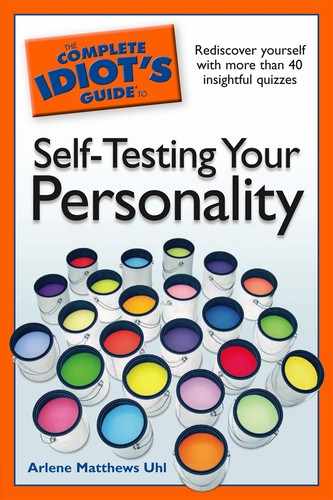Quiz 44
Can I Control My Moods?
We all experience bad moods and negative emotions some of the time. There is nothing wrong with feeling angry or blue for a while. There is a time for everything, but that time must have its limits. If left unexamined and unchecked, bad moods and negative emotions can poison our attitude and outlook, thereby creating a cycle of negativity. But handled with awareness and resolve, bad moods can be put in perspective and we can move on.
Humans and their emotions have been compared to horseback riders and horses. If we ride the “horse” of our emotions, we can rein it in as need be and set our direction afresh. If we let our emotions run wild, they will carry us anywhere and everywhere—like wild horses that refuse to be tamed.
The bottom line when it comes to moods is this: either we take charge of them, or we let them take charge of us. Which is true for you?
Take the Test
For each of the following statements, indicate the number of the statement that corresponds to your level of agreement or disagreement:
1. Strongly disagree
2. Somewhat disagree
3. Feel neutral or are not sure
4. Somewhat agree
5. Strongly agree
1. When I am sad, I cannot imagine ever being happy again.
2. When I am angry at one person, I take out my anger on others as well.
3. I tend to see situations as black or white.
4. When I am upset, it is impossible to make me laugh.
5. I am good at disputing my irrational fears.
6. People know to stay out of my way when I am in a bad mood.
7. When I am upset, the things I usually enjoy bring me no pleasure.
8. When I am upset, I remind myself that I have overcome difficulties in the past.
9. I eat or drink too much when upset, and then feel bad about doing so.
10. I use exercise, breathing, or meditation to calm myself down when agitated.
11. I am capable of putting a problem aside for a bit while I tend to things that need to get done.
12. I can never sleep when I am worried.
13. A setback in the present makes me think about past setbacks.
14. A disappointment in the present makes me feel hopeless about the future.
15. If I feel rejected by one person, I feel like a complete failure.
16. I never want company when I am upset.
17. I believe even the strongest, most successful people have vulnerabilities.
18. If something doesn’t turn out well, I ruminate about what I could or should have done differently.
19. At times I feel unlucky or “star-crossed.”
20. When I am in a bad mood, minor irritations cause my temper to flare.
21. I tend to forget my troubles when I am absorbed in my work.
22. I never think to do anything nice for someone else unless I am personally very happy.
23. People have commented on my ability to “bounce back.”
24. When I make a mistake, I replay it in my head over and over again.
25. I always say, “Tomorrow’s another day.”
Scoring and Explanation
To obtain your score, tally your points. But before doing so, be sure to reverse the score (5 = 1, 4 = 2, 3 = 3, 2 = 4, 1 = 5) for the following items: 5, 8, 10, 11, 17, 21, 23, 25. Remember, in reversing the score, high numbers are traded for low and vice versa. Unless you reverse the scores for the items listed—and only for the items listed—your result will be inaccurate. See the Introduction to this book for a full explanation of reverse scoring.
• A score of 95-125 indicates that you have difficulty controlling your moods. The higher your score, the more you seem to be at the mercy of certain destructive emotions, such as anger or disappointment. You may well have a belief system telling you that you are powerless to regulate your emotions. Perhaps you had role models while you were growing up who seemed to let their bad moods spill into every aspect of their day-to-day lives.
The first step toward gaining power over your emotions is to acknowledge that others like you have consciously and successfully made the transition from “helpless horseman” to “confident rider.” The field of cognitive therapy has a vast body of work devoted to the subject and offers techniques such as learning to actively dispute self-defeating thought patterns. In addition, you may want to investigate meditation and other relaxation and stress-reduction techniques.
The best strategy is to find the methods that work best for you. You might actively chart your moods and note what works best to bring you out of a funk. Most of all, remember: you are not helpless. You have the wherewithal to control your moods.
..................Content has been hidden....................
You can't read the all page of ebook, please click here login for view all page.
